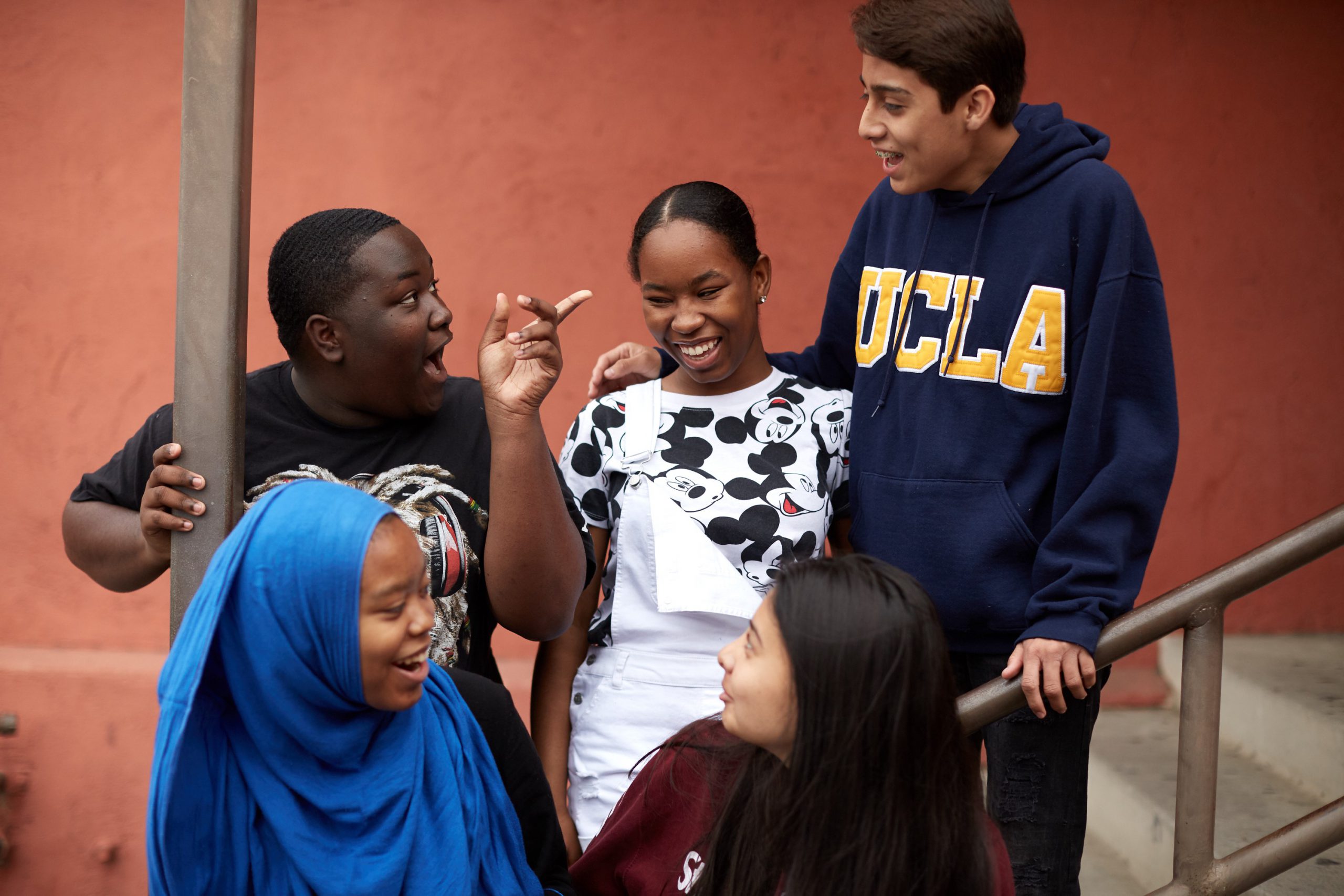The first thing I realized when becoming a teacher was that it is a privilege to be “just a student.” To be a student who doesn’t have to worry about having a place to sleep, warm meals, consistent caring adults, or even their physical well-being frees up mental space to focus on astrophysics or running for student council.


Students who are assured every day that their parents or guardians will be with them until death and that their network of stakeholders are consistent and unwavering. Students who know that they are allowed to make mistakes without consequence of prison or death. Students who have felt known, valued and loved by adults who have no legal ties to them but purely want them to succeed. These are all privileges in a city with 57,794 people experiencing homelessness on any given night. Of this total, 5,091 are under the age of 18, and 5,645 are between the ages of 18 and 24, a 64 percent increase from 2016.
These are among the youth that RISE High serves. Students who have fewer stabilizing than destabilizing factors in their life but are expected to perform at an equal or higher rate in order to catch up to their more affluent peers. Students whose survival tactics are deemed crimes and “love languages” considered unacceptable in the context of 21st-century American schooling. It is no mystery why many of our kids come to us triggered and traumatized by school.
There Are No Better People to Change the World
Despite the challenges these students face, I’ve never seen a more brilliant group of youth in my life. Our students often arrive at the table with abilities and skills like knowing how to raise children, navigate a city both geographically and socially, manage a tight budget, have crucial conversations with adults and peers, manage school, and hold down jobs and other survival-related priorities. Our students are in foster care, have experienced homelessness, may be parents, have been in placement – mostly due to forces outside of their control. With this as their starting line, when given the proper support, there are no better people to change the world and to revolutionize the way we approach education. Now, the question we are committed to answering is: “How do we provide educational equity to these change-makers?”
Meeting the Needs of At-Risk Youth
During our recent trip to New York, we looked to two outstanding schools, and a dream team of educational leaders, for some key insights into the answers. Though we could have visited dozens of schools, Bronx Arena and South Brooklyn Community High School shone brightly as schools directly aligned to our mission and vision for RISE. Through relatively different approaches, these two high schools meet the needs of at-risk youth and provide structures to ensure the holistic support of each and every student in the building. They are innovative and deliberate in their instructional approaches, staffing models, and leadership. Through our visit, we focused on key commonalities between these school models.
XQ Super School: Da Vinci Rise High in Los Angeles from XQ America on Vimeo.
A Devotion to Consistent Mentorship
What we found was that it is mandatory, not optional, for schools serving at-risk youth to have personnel solely devoted to being consistent mentors in students’ lives. Prior to our visit, we believed that this was the responsibility of everyone on staff, therefore making this role unnecessary. Regardless of our beliefs, we also began to realize that without these mentor positions, teachers were consistently exhausted from endless one-on-ones, morning phone calls, and de-escalation meetings with students. Our mental health team was unable to work at capacity due to constant crisis management and coaching social-emotional development. Working through trauma had become a full-time job for everyone.
Defining the Advocate Counselor
This is not sustainable. It’s detrimental to maintaining a strong and healthy staff and is not the most efficient way to support our students. We are now looking into ways to bring on passionate and devoted individuals who seek to work with youth directly as mentors. At both Bronx Arena and South Brooklyn Community, this position is called the Advocate Counselor. These are leaders who have experience working with youth, most preferably “opportunity youth” (young people facing difficult challenges), and are excited and willing to learn. Key trainings are in therapeutic crisis intervention, peer-to-peer mediation, scheduling and transcript translation, parent and guardian communications, and running small group circles and reflections. This single position provides our entire staff with the bandwidth necessary to more effectively approach their roles.


The Need for a Generalist Instructor
Also among the hundreds of incredible insights we received throughout our site visits was the need for a “generalist” instructor in a truly agile and flexible learning environment. At Bronx Arena, the generalist allows the subject specialist to be as agile as needed to serve high school students all across the K-12 spectrum.
To accomplish this, generalist teachers run “arenas.” Arenas are facilitated independent work sessions where students can receive assistance on assignments, engage in peer-to-peer tutoring, and develop the executive functioning skills necessary for future success. These arenas are consistent so that kids develop strong relationships with a small group of peers and a caring adult. This consistency aids long-term growth.
The RISE Accountability Plan was built to help students in their SEL growth & promote a brave space throughout campus from the moment students step into school. Opportunities, stakeholders, & reflections are ways @DaVinciRISEHigh is working to #ReThinkHighSchool pic.twitter.com/NIynGD2iyu
— RISE High (@DVRISEhigh) September 21, 2018
Making Use of Every Second of the Day
Having this supervision allows for the content specialist to “pull out” students based on dozens of factors, including pace, skillset, interest, social-emotional skills, goals, etc. In addition, if there are clusters of students within one arena, a teacher can “push in” to run larger group lessons. Not having designated “class times” allows for the necessary differentiation and helps our students make use of every second of the day to ensure that they aren’t falling further and further behind, regardless of transiency. Now, when a student has a court date, the content specialists can pull them to remediate anything they might have missed with no inconvenience to the student or the teacher.
Revolutionary Insights
These insights have been revolutionary to the growth and development of RISE. Our teachers and academic coaches are outstanding: they have taken on curriculum development through our flexible online learning platform (called DreamSeeDo), learned best practices of trauma-informed care, implemented project and competency-based learning, and used mastery-based grading to best meet the needs of our kids.

Our mental health team has revolutionized what it means to provide in-house supports for youth experiencing high levels of trauma. They have also committed to wearing multiple hats to ensure our teams feel well supported. Our office managers guarantee that every single human at RISE feels known and valued by consistently running enrollment and student intake while simultaneously dealing with the day-to-day happenings on campus.
Our brave founder and principal endured sleepless nights writing and rewriting our second charter petition, working through the budget to ensure our financial health as an organization, supporting and guiding our entire staff, and placing parents and guardians at the forefront of communications while still keeping an eye to the future by composing our five-year plan.

Through all of this, she never allows us to forget that revolution is not a one-time event and that kids always come first. Our team is unstoppable, and with the guidance and solidarity of our students, stakeholders, XQ, and the Da Vinci Schools family and leadership, we will continue to ensure that our students’ continue to RISE!
TAGS:



 Tweet
Tweet 



